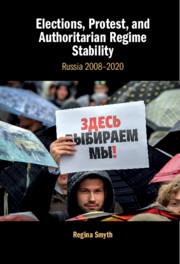Book contents
- Elections, Protest, and Authoritarian Regime Stability
- Elections, Protest, and Authoritarian Regime Stability
- Copyright page
- Dedication
- Contents
- Figures and Tables
- Acknowledgments
- 1 Elections, Protest, and Regime Dynamics
- 2 Winning Elections
- 3 The Long Game
- 4 The Unexpected Power of Weak Opposition
- 5 The Vote Protest
- 6 The Polls Close and Two Movements Emerge
- 7 Protest and Rally Dynamics
- 8 The Perpetual Campaign
- 9 2018–2020
- Book part
- References
- Index
6 - The Polls Close and Two Movements Emerge
Published online by Cambridge University Press: 16 October 2020
- Elections, Protest, and Authoritarian Regime Stability
- Elections, Protest, and Authoritarian Regime Stability
- Copyright page
- Dedication
- Contents
- Figures and Tables
- Acknowledgments
- 1 Elections, Protest, and Regime Dynamics
- 2 Winning Elections
- 3 The Long Game
- 4 The Unexpected Power of Weak Opposition
- 5 The Vote Protest
- 6 The Polls Close and Two Movements Emerge
- 7 Protest and Rally Dynamics
- 8 The Perpetual Campaign
- 9 2018–2020
- Book part
- References
- Index
Summary
Chapter 6 returns to the social movement literature to create a framework to understand who joins post-election rallies and protests. Engaging the complex literature on differential participation, this analysis highlights the critical role of information in mobilization, and explains protest using life cycle variables such as age, education, and income; political interest; personal networks; regime support; and media consumption. This analysis demonstrates that both protesters and rally participants are more interested and better informed about politics than nonparticipants. The analysis also shows that while the regime incentivized pro-regime participation, the ralliers did support the regime and President Putin. The study also highlights the importance of micro-mobilizing structures such as networks on individual-level participation. Among protesters, online discussion helped build mobilizing personal networks and frame alignment. The second part of the chapter explores the meaning of inaction. This analysis shows that popular disengagement in Russia does not signal regime support but it is linked to perceptions that President Putin is crucial to addressing shared grievances.
Keywords
- Type
- Chapter
- Information
- Elections, Protest, and Authoritarian Regime StabilityRussia 2008–2020, pp. 129 - 152Publisher: Cambridge University PressPrint publication year: 2020

